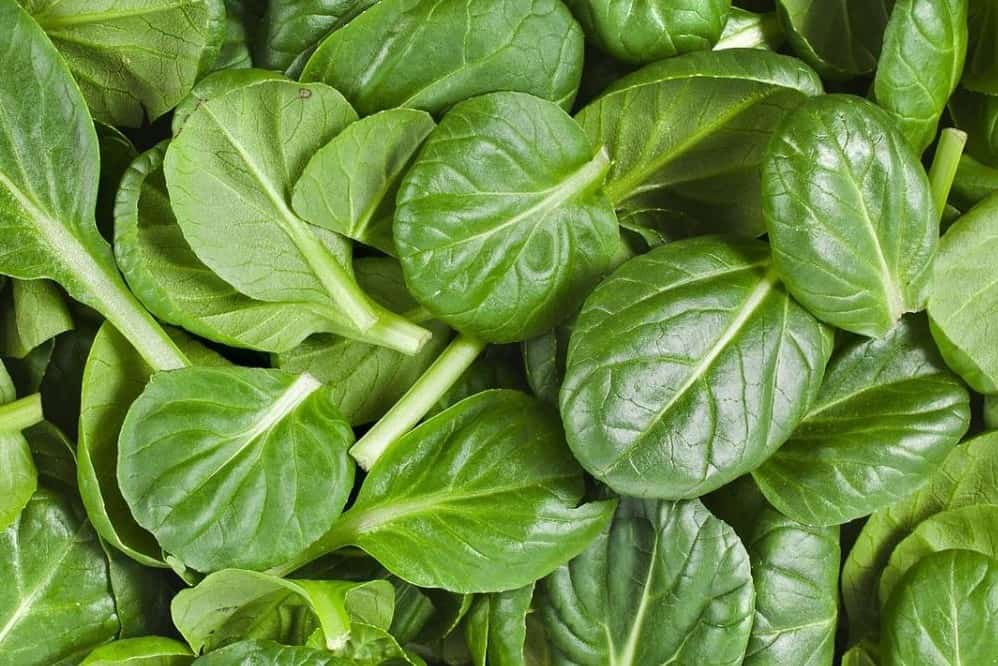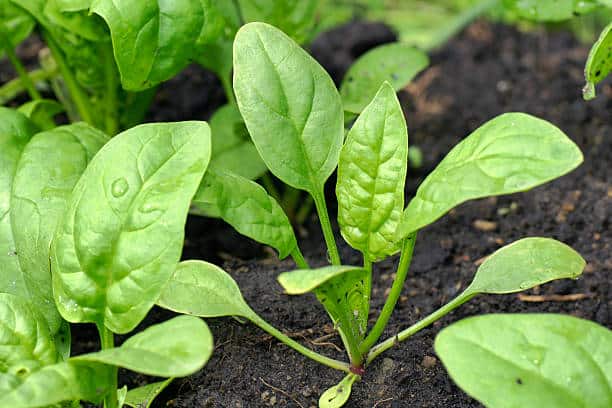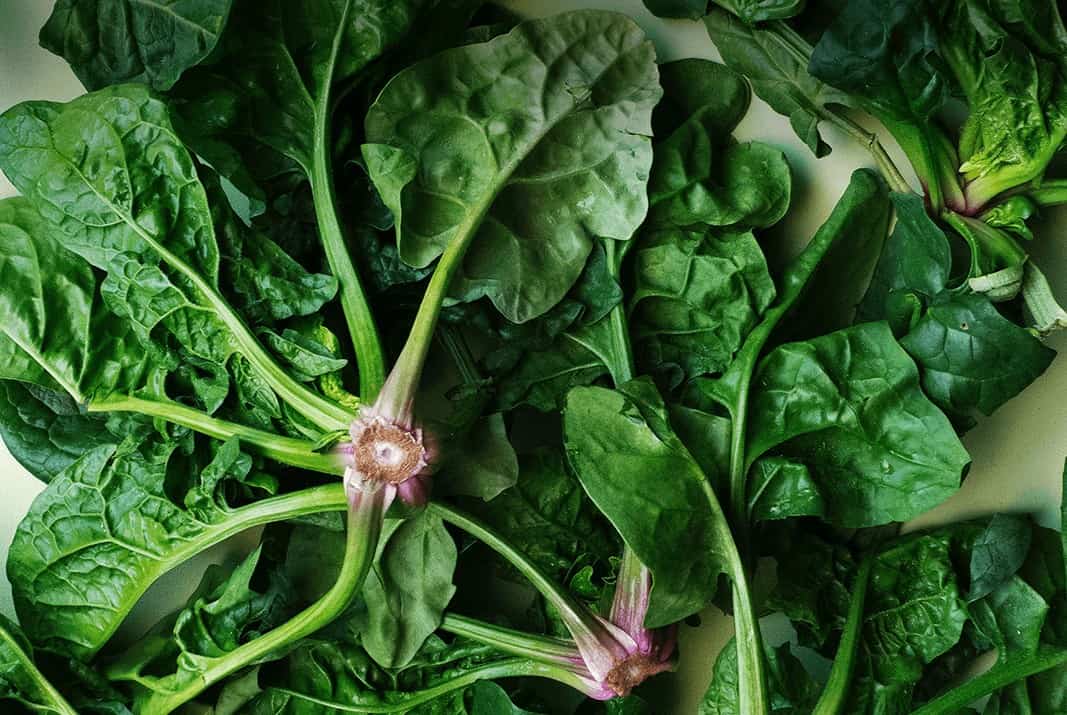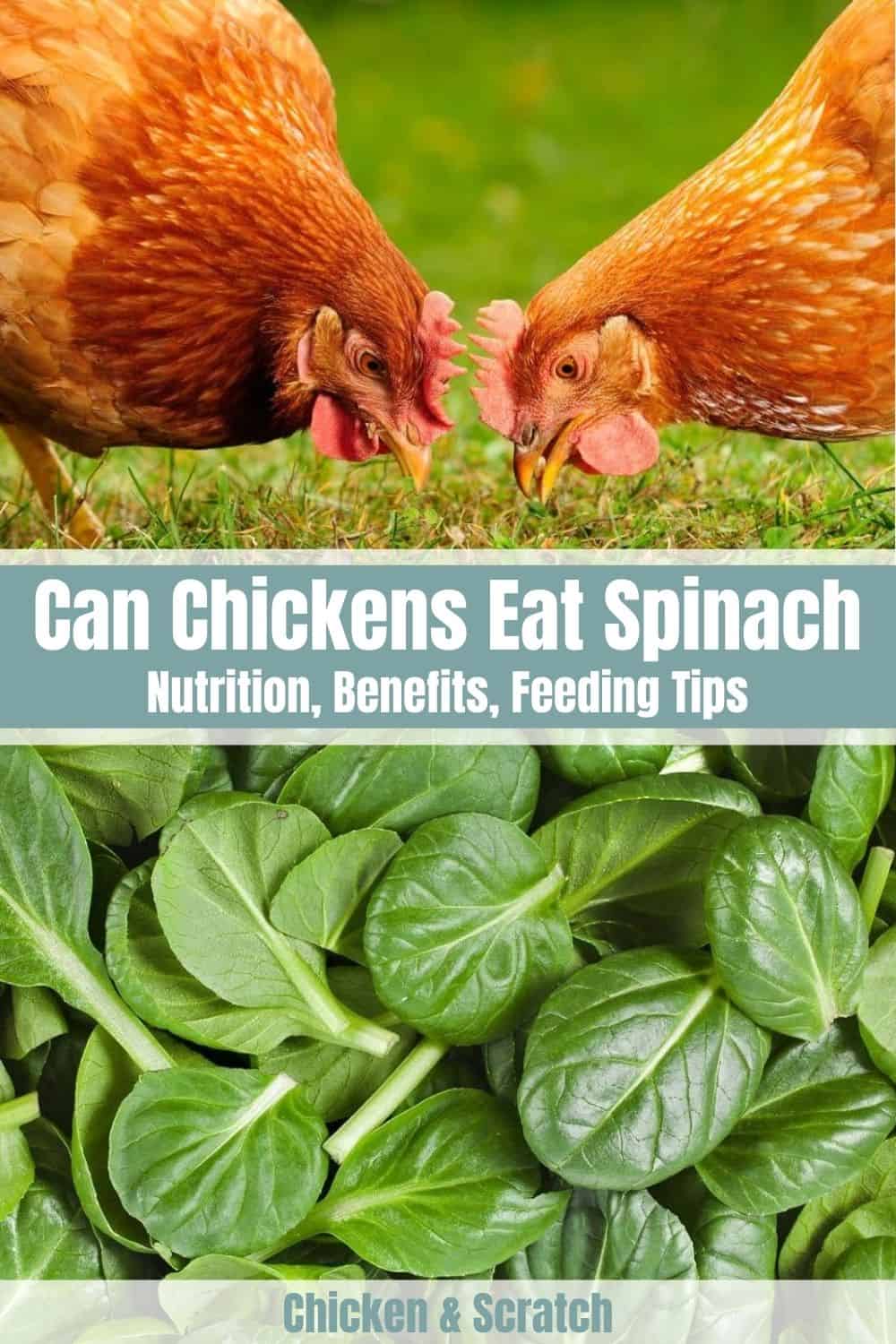Chickens eat a wide range of foods. Chickens are omnivores, which means they eat a wide variety of foods they can find. If you’re new to raising chickens, you might be wondering what chickens eat to stay healthy. WWhen it comes to feeding your chickens, you want to select the best options to ensure that they grow healthy and live a long life.
Raw foods such as fruits and vegetables, in addition to high-quality processed feeds, can help chickens maintain a balanced diet and ensure their health. A diet supplemented with foods like spinach can benefit chickens.
This article will cover
- Is Spinach Safe for Chickens to Eat?
- Nutritional Content of Spinach That Chicken Needs
- What Happens If You Feed Too Much Spinach to the Chickens?
- Proper Way to Feed Spinach to Chickens
- Signs That Chickens Have Calcium-Deficiency Due to Too Much Spinach
Is Spinach Safe for Chickens to Eat?
YES, chickens can eat spinach, BUT only in moderation. Spinach is one of the most nutritious leafy greens you can feed your chickens. It is an excellent source of beta carotene, calcium, iron, magnesium, phosphorus, potassium, and manganese.
Aside from that, spinach is also rich in Vitamins A, C, and K, which are very important to the optimum health of the chickens. It’s one of the best vegetables to feed backyard chickens, according to the RSPCA, because it contains a lot of nutrients the chicken needs. Chickens enjoy eating spinach, and it includes a good number of vitamins and nutrients that your chickens will enjoy.
Nutritional Content of Spinach That Chicken Needs
When it comes to nutrition, spinach offers a wide range of benefits. Spinach is low in calories, can enhance our immunity, and has anti-inflammatory characteristics in humans. When it comes to your chicken’s health, spinach has a lot to give them as well.

VITAMINS
- Vitamin A– is necessary for epithelial cell growth, reproduction, and preservation; this includes maintaining the health of the skin and the linings of the reproductive, respiratory, and digestive tracts.
- Vitamin B1– It is necessary for glucose metabolism. Loss of weight, dull feathers, muscle paralysis, and wing loss are all symptoms of deficiency.
- Vitamin B2– In metabolism, Vitamin B2 is essential. Diarrhea, decreased egg production in mature birds, embryonic mortality, and dead chicks are all Vitamin B2 deficiency symptoms.
- Vitamin B6– Vitamin B6 aids in the proper metabolism of amino acids. Jerky movements and convulsions are symptoms of deficiency.
- Vitamin B9– Folic acid is another name for folic acid. Folic acid is even more critical for developing healthy eggs if your hens are breeding. As a result, spinach is beneficial to chickens at various stages of life.
- Vitamin E- This vitamin is a powerful antioxidant that is required for normal neurological function. Vitamin E contributes to the body’s ability to fight disease. According to some studies, chickens given higher doses of vitamin E recovered faster than those given lower doses. Vitamin E helps chickens defend themselves against infections like E. coli, according to the same study. Vitamin E is also required for cell growth and reproduction in chickens.
- Vitamin K– It aids in the production of prothrombin. Prothrombin aids in the clotting process and prevention of coccidiosis. Vitamin K deficiency can cause hemorrhages in the breasts and leg area, increased blood spots in eggs, and blood clotting problems.

MINERALS
- Calcium – Poultry birds require calcium in their diet. Calcium is essential for chickens’ bone health and the formation of solid eggshells. We all know how vital proper calcium levels are for our laying hens. You can feel good about giving your chickens a spinach treat because you’re helping them get their daily calcium. Your hens will never have difficulty laying eggs with all of this calcium. You’ll never know what it’s like to be afraid of soft shell eggs.
- Choline- Choline is a necessary ingredient for DNA synthesis. It aids in the maintenance of a healthy nervous system. It is essential for muscle development, memory, and pulse regulation. Perosis is characterized by swelling around the hock joint, metatarsal twisting, and flattening of the tarsometatarsal.
- Carotenoids- Carotenoids make the egg yolk achieve the perfect dark orange color. If you’re having trouble getting your eggs to the right color, try feeding spinach. Spinach is high in carotenoids, which have been shown to turn egg yolks orange.
- Folate: Folic acid helps to prevent perosis and supports healthy feathering and look.
- Iron- Iron is required for healthy blood and oxygen levels in all animals. Our chickens may get anemic if we don’t provide it. The chicken feed contains an extra dosage of iron to prevent anemia in laying hens. Giving your hens an iron-rich treat now and then isn’t a bad idea.
- Magnesium– Magnesium helps chickens grow strong bones. It also aids your cells in becoming more efficient at metabolizing food-derived energy. Adding a little spinach to your flock’s diet can help them absorb daily nutrients more effectively.
- Manganese– Manganese is an essential vitamin for hens because it aids in reproduction, eggshell construction, wound healing, food absorption, and strong bone and cartilage development. It also aids in the prevention of perosis.
- Potassium – Potassium can aid in hydration, preventing dehydration in your hens throughout the summer months. It also helps to reduce muscle pain and improves renal function. While most chickens obtain their potassium from their feed, it’s also a nutritious snack.
- Zinc– Zinc improves the quality of eggshells in chickens and other birds.
Other Benefits
- Spinach has anti-inflammatory characteristics, which means it can protect your pets from all types of inflammatory disorders.
- Spinach contains very little sugar and has a low-calorie count. Feeding your chickens spinach will not cause them to gain weight or cause their blood sugar levels to fluctuate.
What Happens If You Feed Too Much Spinach to the Chickens?

Spinach is regarded as a human superfood. For chickens, however, the story is a little different.
Oxalic acid, a chemical molecule found in spinach, can disrupt the body’s mineral balance. By adhering to the mineral and limiting its ability to be absorbed, oxalic acid can interfere with hen calcium absorption.
This can have serious consequences because too much oxalic acid can cause calcium deficiency. The consequences can be even more severe when dealing with an egg-laying chicken because the egg’s outer shell is almost entirely made of calcium.
Calcium is required for the egg-laying process. It aids in the ejection of the egg; thus, a calcium deficiency may make the egg-laying process much more difficult. While oxalic acids can be found in other leafy greens, spinach has a higher oxalic acid content than these other greens, so don’t feed too much spinach to your chickens.
Proper Way to Feed Spinach to Chickens
If you do decide to feed your chickens spinach, make sure you only give them a small amount.
Only a few leaves should be served once a week. If you have the chance, combine spinach with other vegetables and herbs. It will be a much healthier treat for your feathered friends.
As with most leafy greens, your hens will be delighted to see leafy greens in whatever form you choose to serve them. You can make it easier for them by slicing it up and adding it to their feed. You can also simply toss some into their run and let the chickens peck at it.
You can also try adding apple cider vinegar to the chickens’ water supply to counteract the negative effects of spinach. Their stomach acidity will be improved, and calcium absorption will be increased, as a result of the vinegar.
Just make sure you do it responsibly and with regard to the nutrition and well-being of your chickens. Also, don’t feed them spinach that is too old or has gone bad. This may appear to be common sense, but far too many people appear to be unaware of it.

Are all parts of the spinach safe to eat?
Spinach stems and stalks can be eaten by hens. These components should be digestible for the most part by your flock. Your flock should have no trouble eating this, especially since it is a rare treat.
If your chickens already have gizzard issues, the stems may aggravate the problem. These long fibrous fragments could become lodged in the crop, causing it to rot. If your hens are having difficulties, it is best not to feed them the stems.
Which is better: raw or cooked spinach?
Cooking spinach before eating it is a common human practice. The chickens, on the other hand, are a completely different story. Your hens will eat spinach, raw or cooked unless it’s extremely hot. When it comes to health, however, raw spinach is far superior to cooked spinach for your chickens.
Signs That Chickens Have Calcium-Deficiency Due to Too Much Spinach

When you feed spinach to your chickens, you risk depleting their calcium stores. The most common signs and symptoms of calcium deficiency are as follows:
- Eggshells that are thin and weak
- Eggs that have not yet been shelled
- Hens with swollen joints
- Lethargy
- Legs that are rigid
- Lastly, death or paralysis
Conclusion
In conclusion, while spinach offers numerous benefits to chickens, it’s essential to feed it in moderation, considering the potential risks associated with oxalic acid. Always ensure that commercial feed remains the primary diet for your chickens, supplemented occasionally with nutritious treats like spinach.


Joseph Hudson has been raising chickens for over 15 years. In 2018, he completed the Agriculture & Natural Resources program at Mt. San Antonio College. He currently raises over 1400 chickens on his 7.5-hectare farm. He keeps sharing his experience on raising healthy and happy chickens on Chicken Scratch The Foundry.







